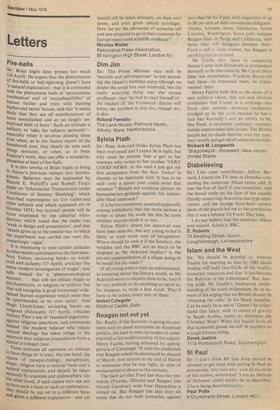Fire-balls Sir: Brian Inglis does protest too much (24 April).
He argues that the phenomenon of fire-balls or ball-lightning doesn't have 'a natural explanation', that it is connected with the phenomena both of 'spontaneous combustion' and of 'incombustibility' of human bodies and even with burning bushes and saints' haloes, and that 'it seems likely that they are all manifestations of some unexplained and as yet largely unexplored field of force'. Such an attitude is unlikely to 'take the subjects seriously'— especially when it involves abusing them even when, as in the Nature report of the Stnethwick case, they clearly do take such things seriously, or when, as in Peter Kapitza's work, they can offer a natural exPlanation at least of fire-balls.
It is also unwise of Brian Inglis to bring in Nature's previous venture into psychokinesis. Believers may be impressed by Harold E. Puthoff's and Russell Targ's DaPer on 'Information Transmission under Conditions of Sensory Shielding', which described experiments on Uri Geller and Other subjects and which appeared on 18 October 1974; but rational people will be more impressed by the editorial introduction, which noted that the paper was weak in design and presentation', and that 'details given as to the precise way in which the experiment was carried out were disconcertingly vague'. It is interesting to note similar attitudes in other recent contributors to the Spectator. Nick Totton, reviewing books on witchcraft and alchemy (17 April), criticises 'the entire modern investigationof magic', and .Calls instead for ' a 'phenomenological account . . that will not reduce magic to PsYchoanalysis, or religion,,or politics, but that will recognise it as an immensely widespread human experience which must first be apprehended in its own terms'. Ahd "ugh Lloyd-Jones, reviewing books on religious philosophy (17 April), criticises Antony Flew's use of 'standard arguments' against religious assertions, and commends instead 'the modern believer who rejects natural theology but takes refuge in the assertion that religious propositions form a sPecial privileged class'. These attitudes all represent an attempt to have things bc+h ways. On one hand, the claims of parapsychology, paraphysics, iltagic, religion have a rational basis and a natural explanation, and should be taken seri°uslY by scientists and philosophers. On the other hand, if such claims turn out not to have such a basis or such an explanation, they should be put on to a different basis
d given a different explanation--and yet should still be taken seriously, on their own terms, and even given special privileges. How far are the advocates of nonsense old and new prepared to go in their contempt for human reason and scientific evidence? Nicolas Walter Rationalist Press Association, 88 Islington High Street, London Ni


































 Previous page
Previous page